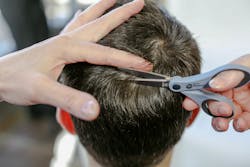New bill seeks DOT approval for alternative drug screen for truckers
A new bill to recognize hair testing as an alternative pre-employment screen and random drug check for truck drivers is being praised by trucking industry groups and some carriers.
The Drug Free Commercial Truck Driver Act of 2015 (S.806 and H.R. 1467) will allow the U.S. Department of Transportation to recognize hair testing as an option to give companies greater flexibility when conducting drug and alcohol testing.
The bill, which would give fleets a choice besides traditional urine tests to meet federal requirements, was introduced Thursday in the Senate by Sens. John Boozman (R-AR Joe Manchin (D-WV) and Sen. Heidi Heitkamp (D-ND) and in the House by Rep. Rick Crawford (R-AR), Del. Eleanor Holmes Norton (D-DC) and Rep. Dan Lipinski (D-IL).
American Trucking Assns. (ATA), the Alliance for Driver Safety & Security (Trucking Alliance) and carrier representatives immediately expressed support for the bipartisan bill.
"This legislation will improve highway safety and protect the reputations of the safe and professional commercial drivers by removing those with a life style of drug use from behind the wheel of large trucks," said Greer Woodruff, senior vice president of corporate safety and security for J.B. Hunt Transport.
A number of fleets voluntarily conduct hair tests, in addition to mandatory urine tests, to identify habitual drug users who may otherwise briefly abstain from use or otherwise attempt to “beat the test” to gain trucking employment. The Government Accountability Office (GAO) has highlighted these limitations in DOT’s current urine drug testing program.
“Leading employers in a variety of industries around the world have recognized that hair testing is a very effective method to detect drug use,” said Dean Newell, vice president of safety and driver training, Maverick USA. “Hair tests are difficult to evade or subvert and provide a better window into an applicant’s potential history of drug use.”
However, because hair tests have not yet been accepted by DOT to meet federal testing requirements, other fleets have been deterred by the redundant costs of employing hair testing programs in addition to the required DOT urine-based tests, ATA contends.
“Though the trucking industry’s positive testing rate is remarkably low, Congress should provide a means for fleets, as part of the DOT testing regime, to further identify and eliminate from the industry those who don’t share the industry’s commitment to highway safety,” said ATA President and CEO Bill Graves.
An ATA position paper details the issue, as does this Q&A.
About the Author
Kevin Jones 1
Editor
Kevin has served as editor-in-chief of Trailer/Body Builders magazine since 2017—just the third editor in the magazine’s 60 years. He is also editorial director for Endeavor Business Media’s Commercial Vehicle group, which includes FleetOwner, Bulk Transporter, Refrigerated Transporter, American Trucker, and Fleet Maintenance magazines and websites.
